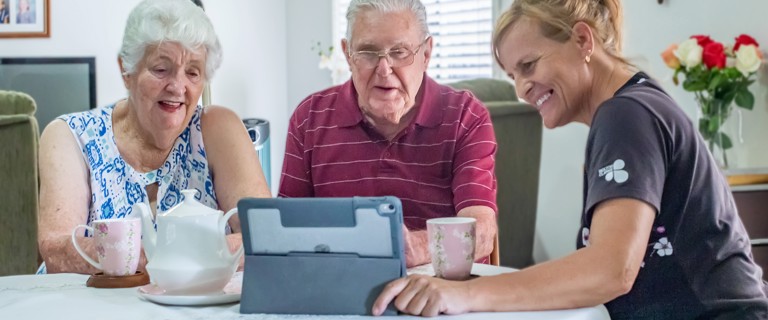Partnering with carers for better dementia outcomes

A new program is working to improve quality of life and health for informal carers and people living with dementia by equipping them with skills, knowledge and access to support.
Bolton Clarke Research Institute is working with Flinders Caring Futures Institute on the Partnership in iSupport Program.
The program has been awarded $1.4 million in support over four years in the Medical Research Future Fund’s Dementia and Aging and Aged Care Mission round. It is expected to reduce the burden on hospital wards and emergency departments, and to keep people living with dementia in their own homes for as long as possible.
There are 200,000 informal carers of people living with dementia in Australia, and informal carers can experience significant negative impacts to their emotional, psychological and physical health.
“They receive less education and limited ongoing support than professional carers do, and this can leave them feeling socially isolated due to the time spent caring for their loved one, stigma and the lack of quality social networks,” Flinders University researcher Professor Lily Xiao says.
“Carers experience stress, poor health and poor quality of life, and this can contribute to the person they care for being permanently admitted to a nursing home earlier than they would if greater support for them existed.”
The Partnership in iSupport Program involves key interventions including providing carers of people living with dementia with a ‘link worker’ who can assist the carer to navigate and access services.
Carers will also have access to the Australian iSupport for Dementia program, an online resource led by Prof Xiao’s team, helping them to develop coping skills, self-care and assertiveness when seeking help from others.
Virtual carer support groups will aim to reduce social isolation among carers and allow them to reach out for support among a social network.
Professor Xiao says the interventions are expected to significantly improve mental health and wellbeing among carers and the people living with dementia and better outcomes for those they support.
Carers engaged through aged care community service provider Resthaven and support organisations throughout the Southern Adelaide Local Health Network, Bolton Clarke Victoria, and Canberra Health Services will take part.
Upon conclusion of the study, it’s expected that researchers will recommend to the government that the program be included in home care packages or in the Medicare benefits schedule.

